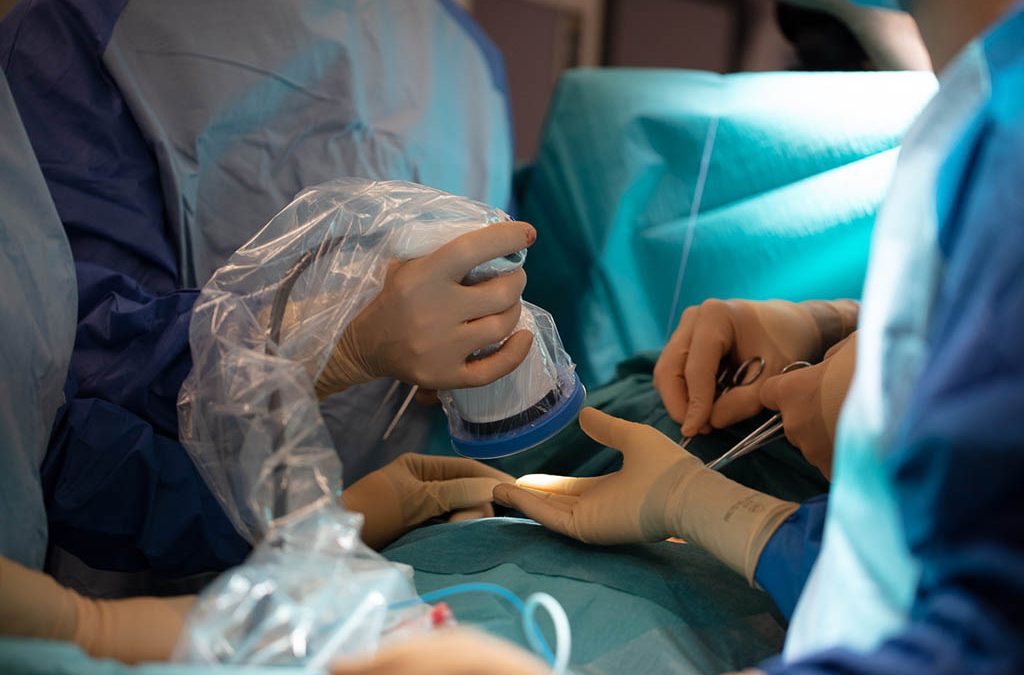Thyroidectomy is an operation that consists in the total or partial removal of the thyroid gland. Do you or someone close to you have a thyroidectomy planned? In this article, we help you better understand this surgical procedure. Learn about the operation and what you need to know to prepare as best as possible.
In what cases is thyroid surgery needed?
Thyroid removal may be indicated for many conditions. The most frequent cases are:
- The suspicion of a cancerous nodule: if alternatives such as treatment with iodine-131 exist, surgery is recommended when the cancer risk is high.
- The presence of a benign nodule: an operation is recommended when the nodule is larger than 25 millimeters and generates discomfort in breathing, swallowing or speaking.
- Thyroid cancer or a goiter with a significant increase in thyroid volume.
- Basedow’s disease, an autoimmune disease which causes hyperthyroidism (an abnormally high production of thyroid hormones).
How to prepare for thyroid surgery?
Thyroid surgery is rarely urgent. It is therefore possible to choose the date and place of the operation. A preoperative consultation is organized to review the details with the surgeon before the procedure.
In most cases, no specific preparation is required. However, if you suffer from a disease such as hyperthyroidism, a treatment may be prescribed before the operation.
The duration of the hospitalization is usually 2 to 3 days. It begins the day before the surgery. Following the operation, you may have to be on medical leave from 10 to 21 days, depending on your health condition and recovery.
How does a thyroid removal operation work?
Thyroid removal is an operation performed under general anesthesia which lasts from 40 minutes to 1.5 hours. The surgeon makes a horizontal incision at the base of the neck of 4 to 8 centimeters. He then removes all or part of the thyroid gland (and sometimes lymph nodes in the neck).
Thyroid surgery is quite common. Thousands of people undergo a total removal of the thyroid gland each year. It is nevertheless a delicate operation, which requires some experience from the surgeon.
What are the risks of thyroid surgery?
Like any surgery, thyroid surgery carries risks. While serious complications are rare, there may be unintentional damage to the thyroid gland that can lead to voice problems (hoarse, broken or muffled voice) if a nerve is damaged. These disturbances can sometimes persist for several weeks after the operation.
Another possible complication is hypocalcemia, an abnormally low level of calcium in the blood. This can occur if there is trauma to the parathyroid glands. These tiny glands at the base of the neck, at the back of the thyroid gland, are not always easy to locate, even for experienced surgeons.
A survey conducted by the French platform Doctissimo among patients who have undergone thyroid surgery reveals that 25% of them have had a postoperative complication. Of the patients who suffered complications, half (50%) had hypocalcemia and one-third (33%) experienced a voice issue.
How can surgery risks be minimized?
The use of innovative technologies reduces the risk of complications. The FLUOBEAM® LX imaging device helps to identify and preserve parathyroid glands during surgery. Thanks to autofluorescence, which aids to locate the parathyroid glands, the surgeon can optimize the procedure. He can operate with greater precision, avoiding the risk of injury.
FLUOBEAM® LX is an imaging device exclusively dedicated to thyroid and parathyroid surgery. It is currently used in Europe and in the United States and more than 20,000 procedures have been performed to date with the FLUOPTICSⒸ technology.
Dr. Clémence Lorentz, ENT Surgeon at the Louis Pasteur Clinic in Nancy, France, believes that FLUOBEAM® LX is an innovative, useful and revolutionary tool that helps to reduce complications and sequelae. She explains: “It is a plus for the clinic, […] and for patients”.
What are the consequences of thyroid surgery?
After a thyroidectomy, it is possible to resume normal activities. However, it is important to wait for the neck to regain its mobility before driving again and to ensure complete healing before practicing sport.
In addition, in the event of a total removal of the thyroid gland, it will be necessary to take hormone replacement therapy for life. This may also be required after a partial removal of the thyroid gland.
The treatment consists of a daily pill of thyroid hormones to be taken starting from the discharge from hospital. Once the right level of TSH (thyroid-stimulating hormone) has been achieved, follow-up will only be required once or twice a year, with a blood test.
Without treatment, patients may suffer from side effects such as extreme fatigue, difficulties to concentrate, memory problems or weight gain.
Thyroid removal is therefore a common operation. Good surgical care, appropriate treatment and regular medical monitoring allow to lead an almost normal life.




